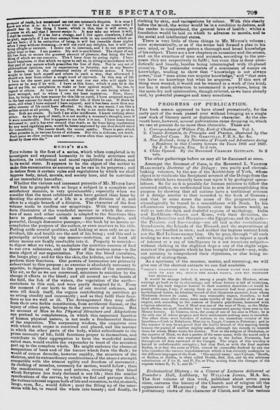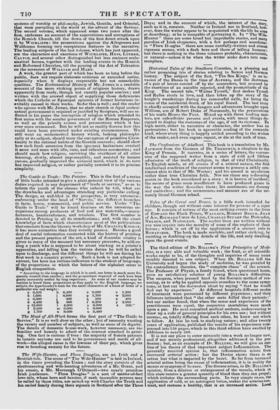Ecclesiastical History ; in a Course of Lectures delivered at
Founder's Hall, Lollibury, by WILLIAM Jonas, M.A. Ikc. The first volume of this work, published about seven years since, narrates the history of the Church and of religion till the appearance of MAHOMET ; the narrative being prefaced by preliminary views of the character of Christ, and of the various
systems of worship or philosophy, Jewish, Gentile, and Oriental, that were prevailing in the world at the advent of the Saviour. The second volume, which appeared some two years after the first, embraces an account of the superstitions and corruptions of the Romish Church, till the dawn of the first direct attack upon it by W ICHLIFFE ; the persecutions against the Albigenses and Waldenses forming very conspicuous features in the narrative. The leading subjects of the last volume, which has just appeared, are the characters and exertions of WICKLIFFE, Huss, LUTHER, CALVIN, and several other distinguished but less eminent eccle- siastical heroes, together with the leading events in the Romish and Reformed Churches, till the passing of the Act of Toleration on the accession of WILLIAM and MARY.
A work, the greater part of which has been so long before the public, does not require elaborate criticism or extended notice, especially when it displays respectable but not remarkable qualities. The Ecclesiastical History of Mr. JONES is a readable account of the more striking points of religious history, drawn apparently from ready, though not exactly popular sources ; and written with the avowed object of supplying those deficiencies which the Catholic or Episcopal opinions of former historians in- evitably caused in their works. So far this is well ; and the reader who agrees with Mr. JONES, that no state church or legal ecclesi- astical government is required or justified by Scripture, will see re- flected in his pages the corruption of religion which attended its first union with the secular government of the Roman Emperors, as well as the priestly crimes and persecutions which it has ever since occasioned. But he will not so readily discern how this could have been prevented under existing circumstances. We still want an ecclesiastical history which, looking philosophi- cally at its subject, should trace the corruption of primitive Chris- tianity to the national habits of the Gentile converts; should show how each fresh accession from the ignorant barbarians overlaid it more and more with idle, vain, and ridiculous ceremonies ; and should mark how religion, surviving the overthrow of all other learning, slowly, almost imperceptibly, and assisted by human causes, gradually improved the national mind, which in its turn has improved religion, or rather partially restored it to its pristine simplicity.



























 Previous page
Previous page